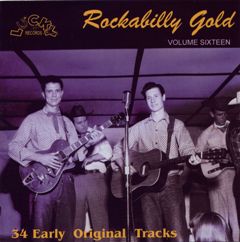Rockabilly Gold 16 (1996)
Rockabilly Gold 16 (1996)

01 - Bill Mack - It's Saturday Night 02 - The Passions - Merci Little Baby 03 - Myron Lee & The Caddies - Aw C'mon Baby 04 - Colleen Frazier - Your Mama's Here 05 - Ray McCoy - Rockin' Baby 06 - Alvis Wayne - Lay Your Head On My Shoulder 07 - Billy Fortune - Trapped 08 - The Echomores - Little Chick 09 - Werly Fairburn - I'm A Fool About Your Love 10 - Sleepy Labeef - I'm Through With You 11 - Lc Smith - Let The Big Time Roll 12 - Corkey Jones - Hot Dog 13 - Bobby Milano - Life Begins At 4 O'clock 14 - Myron Lee & The Caddies - Homicide 15 - Evelyn Marlene - I Wanta Be Free 16 - Andy Anderson - Tough Tough Tough 17 - Peggi Griffith - Rockin' The Blues 18 - Tommy Todd - Tag Along 19 - Johnny & Dorsey Burnette - Till The Law Says 20 - Alvis Wayne - Sleep Rock 'n' Roll 21 - Dusty Owens - Hey Honey 22 - Truitt Forse - Chicken Bop 23 - David Ray Smith - Jitterbuggin' 24 - David Ray - Lonesome Feelin' 25 - The Surfriders - I'm Out 26 - Ray Melton - Boppin' Guitar 27 - Bobby Lee Trammell - Shirley Lee 28 - Johnny Angel - Poor Little 29 - Wink Lewis & Buzz Busby - Zztt Zztt Zztt 30 - Groovey Joe Poovey - You Are My Sunshine 31 - Gene McKown - Little Mary 32 - Rock Larue With The 3 Pals - Baby Take Me Back 33 - Tracy Pendarvis - Belle Of The Suwanee 34 - Johnny Lion - Hunted Heart
Rockabilly was a wild, hepped-up meeting between country & western music and early rhythm & blues. It was one of the very first forms of rock & roll, and it was the first one performed predominantly by white musicians (almost all of whom came from the South). Rockabilly was played with spare instrumentation: a twangy electric guitar and an acoustic stand-up bass whose strings were snapped percussively in a technique dubbed "slap-back" (which sometimes made drums unnecessary). Rockabilly had a thumping, jumping beat that easily made it the most propulsive, visceral, and implicitly sexual style of "white" American music up to that point. Essentially, it made rock & roll accessible to white audiences, thus touching off a cultural revolution the effects of which are still being felt. The genesis of rockabilly dates back to the early '50s, when Bill Haley started fusing electrified country boogie with jump blues. But the style truly crystallized on Elvis Presley's 1954-56 recordings for the Sun label, which captured the manic, primal energy that would become a rockabilly staple. They also established rockabilly's signature production style: echoed vocals, loads of reverb, and a warm, crisp ambience that became the Sun label's trademark. Haley's "Rock Around the Clock" broke rockabilly into the big time in 1955, making it possible for Sun owner Sam Phillips to sell Presley's contract to RCA for a substantial sum of money. Presley became a superstar in 1956, touching off a tidal wave of copycat recordings that, while low on budget and innovation, still inspire rockabilly fanatics with their crazed DIY enthusiasm; additionally, many straight country singers began making rockabilly records, some for the style's popularity, others for its wild excitement. Meanwhile, Phillips used his Presley dollars to gather a stable of rockabilly artists that was second to none: Carl Perkins, Jerry Lee Lewis (who broke from the rockabilly norm by playing piano), Roy Orbison, and singers like Johnny Cash and Charlie Rich who were really country artists at heart. Other significant rockabilly artists were Buddy Holly, who brought melodic pop sensibilities to the music; Gene Vincent, whose crack band featured rockabilly's fastest lead guitarist in Cliff Gallup; Eddie Cochran, whose wry stories of teenage rebellion were overshadowed by his untimely death; and Johnny Burnette, who waxed some of the wildest rockabilly sides ever before finding greater acceptance as a pop idol. As rock & roll evolved into a slicker commercial enterprise, and as the music itself mutated (very quickly) into new forms, rockabilly was left in the dust, largely disappearing from the charts after 1958. However, as the "roll" was slowly siphoned out of rock & roll over the coming decades, artists looking for ways to lend their music a certain raunchiness frequently returned to rockabilly's madly swinging, hip-rolling beat. In the early '80s, there was a full-fledged rockabilly revival; some groups, like the Stray Cats, played up the retro-'50s stylization and greaser image, while others, like the Cramps, loved the raw, crude, amateurish side of the music (usually adding a campy flair) that created a modern subgenre known as psychobilly. ---allmusic.com
download (mp3 @320 kbs):
Zmieniony (Niedziela, 09 Grudzień 2018 16:35)








